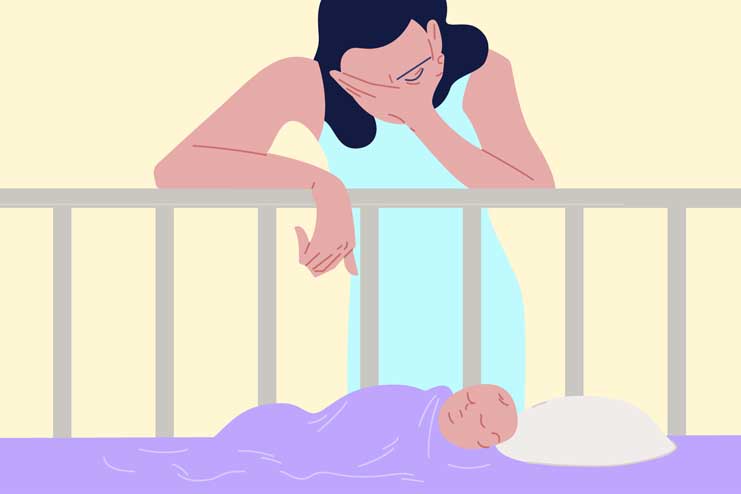The moment that your baby enters the outside world can be the most memorable part of your life. Then what about the postpartum period? It is not going to be the same for everyone all the time. Your lifestyle should be modulated in accordance with your baby’s habits. Your baby needs round the clock attention and care. Apart from the happy and joyful moments, there are certain discomforts for you and your baby. Postpartum Insomnia is one among the discomforts.
As per the studies, nearly 60% of the postpartum women experience poor sleep. Check out the reasons for the postpartum Insomnia and the ways to deal with it.
What is Postpartum Insomnia?

The postpartum period is usually divided into three stages. The initial stage could be avute stage that ranges from 6-12 hours after the birth. Subacute postpartum period lasting 2-6 weeks after the delivery and the delayed postpartum period that may last upto 6 months. Insomnia is a condition in which the person finds it difficult to go to sleep though they have chance to do so. People with this kind of sleep often feel irritable about their sleep patterns.
Changes in your body, hormones, lifestyle, and habits sum up and contribute to the sleep problems in the postpartum period. The feeling of having a new family member who needs round the clock attention may be a stressful thing for all the new parents. It gradually settles down on its own. You should consult your doctor if this postpartum period sustains for the longer time.
In this article, we will discuss the cause and the treatment for the postpartum Insomnia.
Causes of Postpartum Insomnia:

It is a tricky job to take care of the newborn. It is typical to adjust your daily chores to the sleep patterns and the daily habits of your newborn baby. Ultimately, postpartum Insomnia is the sign of all the difficulties that occur in the pathway of your postpartum period. In certain conditions underlying medical conditions may result in this condition and sometimes, it can be the output of feeling overwhelmed, tense, or anxious about the arrival of the newborn. Knowing the causes of Postpartum Insomnia is one of the smart and effective ways of treating it.
Here are a few causes of postpartum Insomnia:
1. Medications:
Certain medications which are used for high blood pressure and asthma can make you end up all the night with Insomnia. Medications that are used for the cough, cold, and sleep might disturb your sleep. Medications including antihistamines may lead to the daytime drowsiness.
If you suspect that your medication is disrupting the sleep and making you feel drowsy consult your doctor.
2. Hormonal Imbalances:
Giving birth may be the miraculous part of the life. But, it can induce some changes in your hormones putting everything off the balance. Imbalances in the reproductive hormones after the birth are quite common and may take some time to regain the equilibrium. Even the slight changes in the hormones can be strong enough to confuse the things and make the situations difficult for the sleep.
3. Night sweat:
Some of the hormones in your body try to flush out the fluids that played a role during the pregnancy. This can make you to sweat more and make you feel sticky, and hot irritating your sleep.
4. Mood Swings:
Moods swings are common throughout the pregnancy and even after the child birth. They are the most common signs of the onset of the postpartum depression or post-traumatic stress disorder. Moving through the several emotional challenges can make your life more challenges and bring in the disturbances in your sleep pattern. If you feel that you are experiencing more than just the anxiety or temporary obsessive compulsive disorder, seek the help from the professional therapist.
5. Baby feeding schedule:
As a new mother, you might have to feed your baby at odd hours. This can disturb your sleep. Sometimes, it is a challenging task for you to go back to sleep after feeding your baby.
Symptoms of PostPartum Insomnia:

It is quite common for all us to lose control and show some unwanted behaviors. Here are a few symptoms that you might encounter while dealing with the postpartum insomnia.
1. Irritability:
Irritability levels may reach the peaks when you don’t get the enough sleep. Sleep deprivation that occurs more than just one night may be difficult for you to rewire your brain. it may make you more prone to the irritations.
2. Sadness:
Sleeplessness might give way for the negative emotions such as mood swings. They make you look dull all the time.
3. Anxiety:
Anxiety can disturb the peaceful hours of your day. Continuous sleeplessness for the consecutive days might make you lose the control over the emotions and might put you easily in the anxious state where everything seems to be blank from the good thoughts to understanding and the realization.
How to Deal with Postpartum Insomnia?

Here are a few effective tips that help you to effectively treat the postpartum Insomnia:
1. Figure out the source:
Recall whether you have any kind of the sleep deprivation in the past. If you have, analyze the frequency and the duration of your sleep disorder. Keep an eye on your emotional feelings.
2. Keep a close eye on triggers:
Postpartum period may throw various challenges ranging from mild to severe. Analyzing the worries, emotions, and the over stimulations might make your postpartum insomnia much severe. Make a note of the triggers of sleep Insomnia in the postpartum period.
3. Keep everything ready:
Frequent night wakings to feed and comfort the baby are the part of the new mom’s life cycle. But, they are to be concerned if you have trouble getting back to sleep.
If you are bottle feeding your baby, it is most common for you to walk into the kitchen and spend there for atleast 10 minutes while you prepare the bottle. This time is more than enough to wake you from the sleep and difficult to fall back to sleep.
The only solution for this is to keep everything ready before hand. Spend some time before you go to bed and bring all the essentials to your sleeping area. Use the smart bottle warmers so that you can avoid the need to rush into the kitchen. Keep everything in your reach and feed when your baby before they broke out the loud cry.
4. Create a cozy environment for your sleep area:
Smart sleep habits can help you to have the sound sleep throughout the night. Keep your room cool, dark and quiet all the time. It is quite difficult to get into the sleep in a room that is closer to disturbances and the other loud noises.
Colors of various things might change the moos and the sleep quality. Ensure to select pleasant colors for the bed sheets, carpets, and all the other accessories in your sleeping area.
5. Share the chores with your partner:
You are the luckiest person if you have got the partner who can share the workload with just a smile all the time. Seek your partner’s support to finish all the chores on time and go to sleep at the early hours. Don’t take stress to handle everything on your own because, it is absolutely impossible while you have your newborn. Share the activities related with your partner and finish them with no stress.
6. Say no to stress & anxiety:
You are not alone. Share the concerns and the other things with your partner to get the relief from the stress. Stress and anxiety are like the anesthesia that may paralyze you. Make your brain to work effectively. It is your responsibility to pay round the clock attention for your baby and don’t feel it stress. Pay keen interest to the milestones of your baby and help them to reach them on time. Simply love and affection towards your baby are the stress relieving things. Boost up your energy levels and be prepared to adjust yourself as per the lifestyle and the habits of your baby.
7. Avoid the screen time:
Melatonin is the primary hormone that regulates the onset of the sleep. Our brain usually releases it. Unfortunately, in recent times, artificial lights, TVs, computer, tablet, and phone screens that emit the blue light that can reduce the release of the melatonin.
Just putting your phone won’t help. It is better to leave it outside of your bedroom.
Some new moms check their phones constantly during the breastfeeding. They would like to keep them updated with all the happenings around them. Keep the phone off when you are with your baby and take each and every moment to the heart.
8. Sleep with your baby:
Many new moms are used to catch up the time that the baby sleeps on some daily chores. But it is wise to sleep for some time with your baby to ensure that you are getting enough amounts of sleep.
9. Follow some relaxation techniques:
Deep breathing is the best way to get some relief from the stress. Belly breathing is one of the relaxation techniques that work effectively to relax and calm down the muscles.
Here are a few steps on how to do this:
● Lie flat on your back with one hand on the stomach and another on your chest.
● Inhale deeply through the nose and fill up your belly with the air. Your stomach will rise as the stomach fills up.
● Once you finish inhaling, hold it for three breaths.
● Exhale through the mouth and feel dropping your stomach dropping back to its normal position.
● Continue until you feel sleep.
10. Cognitive behavioral therapy:
Cognitive behavioral therapy is likely to improve the postpartum insomnia and its associated depression.
Switch over to some relaxing music that can relieve the stress and the anxiety after the birth. Apps with delta wave relaxing music can work well for the sleep insomnia.
11. Keep your room dark:
Our bodies are designed to operate on the 24-hours sleep wake cycle. It signals us to sleep when it is dark and to awake when it is light. If you are relying on the internal clock to get back to sleep, it is a sign that you have disrupted sleep cycles.
Keep your room dark at the night and limit the impact of the lights. Ensure that the light is enough to monitor your newborn.
12. Avoid caffeine:
This is the most effective way to get rid of postpartum insomnia. Avoid the use of beverages that contain caffeine before the bedtime. Caffeine shows the disrupting effects on the sleep. Studies found that caffeine adversely affects the sleep quality and the daytime activities. Sleep deprivation further impacts the functioning of the brain. Caffeine is found to be the most widely used stimulants of the world and it is used about 90% of the American Adults almost daily.
Avoid taking coffee before the bedtime instead you can choose the alternatives such a glass of warm milk, chamomile tea, and even the green tea which can be effective, if you are planning to control your weight gain.
Home Remedies for the Postpartum Insomnia:
If the severity of the situation is acute, you need not to rush here and there for the solution. Simply rush to your pantry where you can find plenty of the home remedies available. There are many techniques that you can do at your home. Here are some home remedies for the postpartum Insomnia too.
1. Chamomile Tea:
It reduces the menstrual pain and lowers the blood pressure. It is the effective remedy for the cancer treatment and prevention. It helps with the sleep and the relaxation.
This is a short term treatment. A research suggested that women who consumed
Chamomile tea for 2 weeks improved sleep quality associated with depression. The effects of this tea last for only four weeks. Studies proved that postpartum women drinking the chamomile tea had low levels of depression and the other physical symptoms that are associated with the insufficient sleep.
2. Lavender Tea:
Lavender tea can help to alleviate the issues that are associated with the digestion. In addition to this lavender will also help to alleviate the headaches, toothaches, and sores. Studies proved the effectiveness of its aromatherapy in improving the quality of sleep.
This is also a short term therapy and the fragrance of the lavender will help to induce the positive emotions in the mother for the baby. In a research, where the mothers are given two cups of lavender milk for two weeks was observed that moms are tend to form the strong attachment with the babies with the low levels of depression.
3. Acupressure:
Acupressure is one of the best ways to cure postpartum Insomnia. It is an alternative medicine technique. It is all based on the concept of the life energy which flows through the meridian. In this treatment, pressure is applied to the acupuncture points with the theme of clearing the blockages.
It is the recommended postpartum Insomnia treatment. In one research, a 14-days auricular acupressure therapy on postpartum women was proved to be effective in improving their sleep quality.
4. Massage therapy and yoga:
Massage and yoga are the great natural ways to relieve stress and improve the concentration. Practice the massage and yoga early in the morning as long as you can.
Massage your body and especially feet every day with essential or natural coconut oil. The main guidelines to follow while choosing the essential oil is to dilute it with the carrier oil. Do the massage when the oil is slightly warm.
5. Mineral supplements:
Magnesium and the iron play a prominent role in alleviating any neurological problems. Taking any supplements with these minerals will help to induce sleep and reduce the anxiety.
Note: melatonin supplements are not recommended for the breastfeeding moms as they pass through the placenta into the breast milk.
6. Sleeping aids:
If the Insomnia gets severe, you can take some sleep aids prescribed by your doctor. Never go for the own medication especially during the postpartum stage as it may adversely affect the quality and the quantity of the breast milk.
In conclusion, postpartum Insomnia is quite common and nothing to worry about it. Relaxation techniques to alleviate the depression are the only technique that can work effectively to deal with the postpartum Insomnia. Enjoy the best ever lovable moments with your baby during the postpartum period because, you will never those cute moments back in your life.
FAQ’s:
1. How long Postpartum Insomnia last:
The onset of this condition may be immediate and can sustain for months if not recognized. Simple techniques mentioned in this article can work to handle this situation. If you are still struggling with this situation consult your doctor.
2. Is this linked to postpartum depression?
Sleep deprivation, depression, and insomnia hold a strong link between them. Postnatal depression can be a major contributing cause for the insomnia. When you did not find the cure, the best solution is to put back your sleep patterns back on the track.
3. What is the difference between the Sleep Deprivation and Insomnia?
Sleep deprivation and Insomnia are not the same. Sleep deprivation is when you could not sleep well because of the external disturbances. Insomnia, on the other hand is the inability of the person to fall asleep even when everything is calm and environment is quite comfortable for sleep. Physical and mental health problems are associated with Insomnia.










































